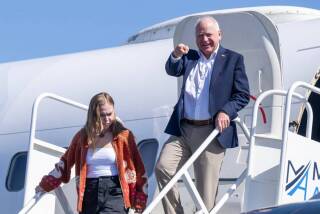Appeal Court Backs Right of Parties to Endorse Candidates in Primaries
- Share via
In a decision that could produce major changes in California politics, the U.S. 9th Circuit Court of Appeals Wednesday ruled that state political parties have the right to endorse and oppose candidates for partisan political office in primary elections.
Declaring California election laws outlawing such practices unconstitutional, U.S. Circuit Judge William A. Norris of Los Angeles called the state ban on primary endorsements by political parties “a form of paternalism that is inconsistent with the First Amendment.”
The decision by a three-judge panel of the 9th Circuit affirmed an April, 1984, ruling by U.S. District Judge Marilyn Hall Patel of San Francisco, after a lawsuit challenging the constitutionality of state election laws restricting the activities of political parties.
The lawsuit pitted a coalition of academics and political activists, called the California Committee for Party Renewal, against Secretary of State March Fong Eu, who argued that voters should be free to select primary candidates without undue influence from party leaders.
Unexpected Result
Norris, tracing the history of California reform politics to Republican Hiram Johnson’s crusade to purge state political parties of controlling special-interest groups, said the unexpected result of increased regulation is that the state “has effectively drained” party central committees of political power.
“The secretary’s fear that party members will blindly rubber-stamp the party’s endorsement is speculation not borne out by either experience or common sense,” Norris wrote. “We think that the secretary has given voters too little credit.”
Deputy Atty. Gen. Geoffrey Graybill, who defended the state in the original lawsuit, noted that the 9th Circuit had stayed Patel’s original order for more than two years while debating its own decision.
California will appeal to the U.S. Supreme Court if necessary to overturn the decision, Graybill said. Meanwhile, he added, the state will seek another stay to prevent the historic change in the powers of political parties from taking place immediately.
Joined Case
Joining the California Committee for Party Renewal in the lawsuit were the state central committee of the Libertarian Party of California, the Los Angeles and San Francisco County Democratic central committees and the San Francisco County Republican Central Committee.
Jim Fay, a political science professor at California State University, Hayward, and one of the leaders of the reform movement in Northern California, said the major changes in the immediate future will primarily be in terms of the increased public voice that the political parties will have.
“In the short run, it’s not going to change much except be another source of information for the voters,” he said. “Political parties are historically weak in California. We hope that over time, however, the parties will increase their strength at the local level.
Lifting Ban
Fay denied that any increase in the power of California’s political parties would produce Chicago-style machine politics--a major allegation of those opposed to lifting the ban on party endorsements in primaries.
In addition to permitting the endorsement and opposition of candidates for partisan office in primary elections, the 9th Circuit ruling upheld a decision by Patel invalidating other portions of the California Elections Code regulating the membership of both state and county committees of political parties.
Among the regulations declared unconstitutional were laws regulating the selection of state central committee members and restrictions on the length of time that committee chairmen of political parties may stay in office.
Praising the ruling, Betty Smith, state Democratic Party chairwoman, predicted that the decision will strengthen the power of all California political parties in future elections and also enable them to publicly oppose fringe-group candidates, such as followers of political extremist Lyndon LaRouche, who run under the Democratic banner.
Welcome Chance
“It’s too early to make any predictions, but the party structure will probably change,” she said. “We look forward to making endorsements in future elections. We might not do so in every case, but we are glad to have the chance.”
Paul Flum, a San Francisco lawyer involved with the party renewal coalition, said the 9th Circuit ruling may be used in future legal challenges of Proposition 49, a state constitutional amendment approved by California voters June 3 that bans political parties from endorsing candidates in nonpartisan races, such as judicial and school board elections.
Patel had refused to rule on the question of nonpartisan elections in her 1984 decision, because the issue was then also before the California Supreme Court. Proposition 49 was drafted by the Legislature, after the state court suggested that the Legislature was the proper government body to decide the issue.
More to Read
Get the L.A. Times Politics newsletter
Deeply reported insights into legislation, politics and policy from Sacramento, Washington and beyond. In your inbox twice per week.
You may occasionally receive promotional content from the Los Angeles Times.










